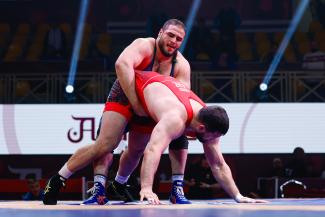“Best Wrestler of the Year” Awarded to Taylor, Olli, and Bacsi
Tuesday, January 1, 2019 - 16:58 By United World Wrestling Press

CORSIER-SUR-VEVEY, Switzerland (January 1) – With the 2018 wrestling season officially at a close, United World Wrestling has awarded “Best Wrestler of the Year” honors to David TAYLOR (USA) in freestyle, Petra OLLI (FIN) in women’s wrestling, and Peter BACSI (HUN) in Greco-Roman.
The award was based on the number of ranking points each of the wrestlers attained over the course of the 2018 season. A majority of points were earned at the world and continental championships, with additional points earned at a number of style-specific Ranking Series tournaments around the world.
For their efforts, Taylor, Olli and Bacsi each received a 10,000 CHF prize from United World Wrestling.
Taylor, the 86kg world champion in freestyle finished the season with 112 total ranking points. In addition to his world title Taylor took gold at 2018 Senior Pan-American championships, the Ivan Yariguin (Ranking Event), and the Yasar Dogu (Ranking Event). Taylor didn’t lose a match all season.
“I’m really grateful for the opportunity to compete for the USA and represent the Nittany Lion Wrestling Club,” said Taylor. “I wouldn’t have been able to reach this point without my coaches, training partners, and the treigning lab. I’m honored to be the wrestler of the year and look forward to 2019!
Olli, the 62kg world champion in women’s wrestling finished the season with 110 points. The first-ever Finnish world champion in women’s wrestling, Olli also took gold at the 2018 Senior European championships and the Klippan Ladies Open (Ranking Event), as well as a silver at the Ziolkowski/Pytlasinski/Poland Open (Ranking Event).
"I am very grateful and surprised to get such a great honor of recognition,” said Olli. “Wrestlers of the Year is a recognition means a lot of our team who works with me every day, but also for all of the Finland wrestling family.”
Bacsi, the 82kg world champion in Greco-Roman finished the season with 82 ranking points. In addition to his world title, the Hungarian wrestler also the gold medalist at the Granma y Cerro Pelado (Ranking Event) and silver at the Hungarian Grand Prix (Ranking Event).
At 35 years old, Bacsi was also this year’s oldest world champion in any wrestling style.
The 2019 United World Wrestling season will start on January 24th at the Ivan Yariguin Grand Prix in Krasnoyarsk, Russia with Ranking Series points up for grabs in freestyle and women’s wrestling.


Share your thoughts.
Comments